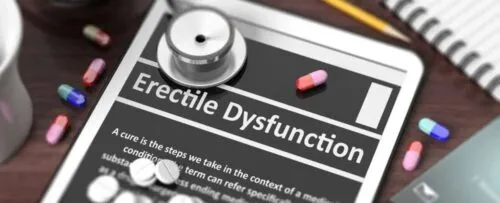Erectile dysfunction (ED) is a condition that affects millions of men worldwide, and its treatment is a topic of significant interest and concern. In this comprehensive guide, we will delve further into the various aspects of ED treatment while providing valuable insights, FAQs, and answers to help individuals and couples navigate this common health concern.
Understanding Erectile Dysfunction (ED)
Erectile dysfunction is a multifaceted condition with diverse causes. While occasional difficulties in achieving or maintaining an erection are normal, persistent ED can have a profound impact on a man’s quality of life. Understanding the underlying causes is crucial for effective treatment.
Causes of Erectile Dysfunction
- Physical Factors: ED can be linked to physical conditions such as diabetes, cardiovascular diseases, hypertension, obesity, and hormonal imbalances. Addressing these underlying issues can often improve erectile function.
- Psychological Factors: Stress, anxiety, depression, and relationship problems can contribute to ED. Psychological counseling and therapy can be valuable components of treatment.
- Lifestyle Factors: Unhealthy lifestyle choices, including smoking, excessive alcohol consumption, and a sedentary lifestyle, can increase the risk of ED. Making positive lifestyle changes can significantly impact erectile function.
Lifestyle Changes for Managing ED
A holistic approach to ED treatment often begins with lifestyle modifications. Here are some practical tips for managing ED through lifestyle changes:
1. Dietary Choices
A balanced diet that includes a variety of nutrients is essential for vascular health. Antioxidant-rich foods like berries, leafy greens, and whole grains can support overall well-being.
2. Regular Exercise
Regular physical activity not only improves cardiovascular health but also enhances mood and self-esteem. Exercise can increase blood flow, which is essential for erectile function.
3. Stress Management
Chronic stress can exacerbate ED. Stress-reduction techniques like mindfulness meditation, yoga, and relaxation exercises can help alleviate psychological factors contributing to the condition.
Medications for ED
Oral medications, known as PDE5 inhibitors, are often the first-line treatment for ED. These medications include Viagra (Sildenafil), Cialis (Tadalafil), and Levitra (Vardenafil). They work by increasing blood flow to the penis, facilitating erections when sexual stimulation occurs.
FAQs about Medications for ED
Q1: How do PDE5 inhibitors work?
PDE5 inhibitors relax the smooth muscle cells in the penis, allowing for increased blood flow when sexually stimulated. This results in improved erectile function.
Q2: Are PDE5 inhibitors effective for all men with ED?
PDE5 inhibitors are effective for many men, but not all. Their efficacy may vary based on the underlying cause of ED and individual response.
Q3: Are there any side effects of PDE5 inhibitors?
Common side effects include headache, flushing, indigestion, and nasal congestion. It’s essential to consult a healthcare provider for guidance and potential side effects.
Vacuum Erection Devices (VEDs)
For men who prefer non-invasive methods, vacuum erection devices (VEDs) offer an alternative. These devices create a vacuum around the penis, drawing blood into the organ to induce an erection.
FAQs about VEDs
Q1: How does a vacuum erection device work?
A vacuum is created around the penis, drawing blood into the erectile chambers. A constriction ring is then placed at the base of the penis to maintain the erection.
Q2: Are VEDs safe to use?
VEDs are generally safe when used as directed. However, it’s crucial to follow instructions carefully to avoid potential complications.
Q3: Can VEDs be used in combination with other ED treatments?
VEDs can be used alone or in combination with other treatments, as recommended by a healthcare provider.
Penile Injections and Urethral Suppositories
Injections or suppositories that deliver medication directly to the penis or urethra can be effective for ED treatment. These treatments stimulate blood flow, leading to improved erections.
FAQs about Injections and Suppositories
Q1: How are injections administered?
Injections are self-administered into the side of the penis using a fine needle. Healthcare providers provide guidance on proper technique.
Q2: What is the difference between injections and suppositories?
Injections involve injecting medication directly into the penis, while suppositories are inserted into the urethra. Both methods aim to increase blood flow.
Q3: Are there potential risks associated with injections and suppositories?
Yes, there can be risks, including pain, priapism (prolonged erection), or infection. It’s essential to use these treatments under medical supervision.
Penile Implants and Surgery
In cases where other treatments are ineffective, surgical interventions may be considered. Penile implants, also known as prostheses, are surgically placed devices that allow for on-demand erections.
FAQs about Penile Implants and Surgery
Q1: How does a penile implant work?
A penile implant consists of inflatable or malleable rods that are surgically placed in the penis. It allows for manual control over erections.
Q2: Is penile implant surgery reversible?
Penile implant surgery is generally irreversible, so it’s essential to carefully consider the decision in consultation with a urologist.
Q3: What are the success rates of penile implant surgery?
Success rates are high, with most men reporting satisfaction with the results. However, individual experiences may vary.
Psychotherapy and Counseling
Erectile dysfunction can often have psychological components, such as performance anxiety or relationship issues. Psychotherapy and counseling can help individuals and couples address these aspects.
FAQs about Psychotherapy and Counseling
Q1: How can psychotherapy help with ED?
Psychotherapy can help individuals identify and address psychological factors contributing to ED. It may also improve communication and reduce anxiety.
Q2: Is couples counseling beneficial for ED?
Couples counseling can be highly beneficial, as it provides a supportive environment for both partners to discuss and address the impact of ED on their relationship.
Q3: How can one find a qualified therapist or counselor?
Seeking recommendations from healthcare providers or organizations specializing in sexual health can help individuals and couples find qualified therapists.
Final Thoughts: Seeking the Right Path for ED Treatment
Erectile dysfunction is a complex condition, and treatment options should be tailored to individual needs. The journey towards restored sexual function and improved quality of life often begins with seeking professional guidance.
In final thoughts, understanding the causes, treatment options, and lifestyle modifications associated with erectile dysfunction is crucial for individuals and couples facing this condition. By taking proactive steps and exploring the available treatments, many individuals can regain confidence, enhance their relationships, and enjoy a fulfilling sex life once again.
As ongoing research and advancements continue to expand our understanding of ED, individuals are encouraged to consult healthcare professionals to explore the most suitable treatment plan. Seeking help for erectile dysfunction is a positive and proactive step towards better physical and emotional well-being.
Disclaimer: This content is for informational purposes only and should not be considered as medical advice. Always consult with a qualified healthcare professional before starting any medication or treatment for erectile dysfunction or following any point mentioned on this page and whole of our website adrclinic.co.uk

